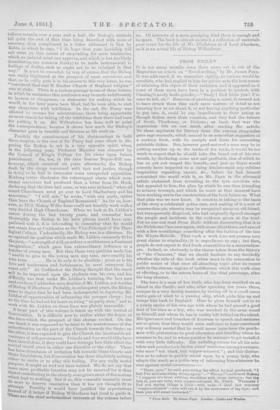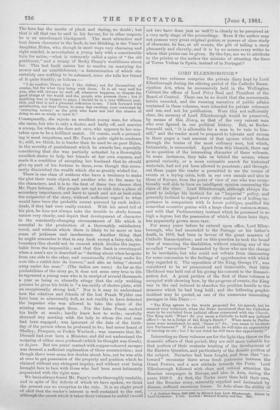F II OM E XILE .* IT is not many
months since there came out in one of the Magazines an article on " Novel-writing," by Me. James Payn. It was addressed, if we remember rightly, to various would-be novelists, who had applied to him for advice as to the best means of attaining this object of their ambition, and it appeared as if
some of them must have limn iu a position to protest, with Canning's needy knife-grinder,—" Story I God bless you ! I've none to tell, sir." Desirous of producing a novel, it seemed not
to have struck them that such mere matters of detail as not knowing how to set about it, or not haviug anything particular' to put into it, could be any impediment to their acting as though fiction were their vocation, and they had the talents of Scott, Thackeray, or Dickens ; at least, that was the impression left on our mind, after reading the article.
To those aspirants for literary fame the veteran story-teller gave sage counsels, which seemed to us somewhat suggestive of a cookery book, with its receipts and hints for concocting palatable dishes. But, however good-natured a man may be in putting another up to the tricks of his trade, it would be too much to expect that he should take the bread out of his own mouth, by disclosing some new and profitable idea of which he has as yet not reaped the benefit; and just as Soycr would scarcely have imparted to a rising kitchen-maid any sublime inspiration regarding sauces, &c., before he had himself astonished the world with it, so Mr. Payn in the aforesaid article abstained from revealing to the tyro novelists who had appealed to him, the plan by which he was then intending to achieve triumph, and which lie must at that moment have been working out in the construction of the book before us. What that plan was we now know. It consists in taking as the basis of the story a celebrated police case, and making of it a sort of resurrection-pie, wherein may be recognised many an old friend, but transparently disguised, who haul originally figured amongst
the people and incidents in the evidence given at the trial. For no one can read Prom Exile without discovering that it is the Tichborne Case over again, with some alterations, and sauced
with a few moralisiugs something after the fashion of the late Mr. Whyte-Melville. That such a work does not possess very groat claims to originality, it is superfluous to say ; but then,. people do not expect to find fresh comestibles iu a resurrection- pie. Indeed, so obviously is the theme taken from the history of "the Claimant," that we should hesitate to say decidedly whether the title of the book refers most to the restoration to public notice of that once all-absorbing topic after its recent exile in the obscure regions of indifference which this work aims at effecting, or to the return home of the chief personage, after his long absence. •
The hero is a man of low birth, who has been wrecked on an island in the Pacific, and who, after spending ten years there, escapes in a very daring manner, by rowing off in a small canoe and a gale of wind to a passing ship, which picks -him up and brings him back to England. Here lie gives himself out to be a young squire of his own age with whom ho had passed a good. deal of his time as a boy, who was wrecked iu the same vessel as himself, and whom ho has in reality left behind on the island. His ignorance and breaches of decorum in speech and manners are so gross, that they would seem sufficient to have convinced any ordinary mortal that ho could never have been the gentle- ran with pretensions to good education and breeding whom he assumes to be, and in whose position he manages to get installed with very little difficulty. His unfailing excuse for all his mis- takes and gauckevies is his ten years' residence amongst savages, who were " not black, but copper-coloured." ; and this distinc- tion as to colour is quickly seized upon by a young lady, who adopts the word, as a polite way of informing him whenever he sins against social eonvenances :— " There, now," he said, perceiving the effect he had produced, "I feel I've said something wrong again."—" Wrong !" exclaimed Helen; "1 suppose it's from rubbing shoulders with those savages ; but the fact is, you are very, very copper-coloured, Mr. Frank. Whonerer find you saying timings a little—well, rude-1 shall just murmur ' copper-coloured'—you will see it by the movomont of any lips ; and than you will stand corrected."
• Front Exile. By James Payn. London : Matto and Windue. The hero has the merits of pluck and daring, no doubt ; but that is all that can be said in his favour, for in other respects he is an unredeemed blackguard. The most attractive and best drawn character in the book, to our thinking, is the Vicar's daughter, Helen, who, though in most ways very charming and right-minded, is nevertheless a young lady with a considerable
turn for satire,—what is commonly called a spice of " the old gentleman," and a twang of Becky Sharp's worldliness about her. This last fault causes her to resolve on marrying for money and an establishment,—a determination of which she certainly saw nothing to be ashamed, since she tells her friend of it quite frankly, as follows :—
" I do confess, Grace, that I like riches ; not for themselves, of course, but for what they bring with them. It is all very well for you, who will always be well off, whatever happens, to despise the good things of the world and the people who possess thorn ; but if anything was to happen to papa, I should be in a very different posi- tion, and that is not a pleasant reflection to me. I look forward with satisfaction, my dear Grace, to some day exciting your contempt by marrying money,' as the girls who have not had the chance of doing so are so ready to term it."
Consequently, she rejects an excellent young man, for whom she cares, but who is only a doctor, and badly off, and marries a scamp, for whom she does not care, who appears to her mis- taken eyes to be a brilliant match. Of course, sucb a proceed. ing is most iniquitous, and Mr. Payn is quite right to condemn it ; still, we think, he is harder than ho need be on poor Helen, in the severity of punishment which he awards her, especially considering that she was partially actuated by a thoroughly unselfish desire to help her friends at her own expense, and made it a condition of accepting her husband that he should give up part of his fortune to them, even though this neces- sarily diminished the wealth which she so greatly wished for.
There is one class of authors who have a tendency to make the plot their main object, and another who do the same by
the characters, and it is to the first of these two classes that Mr. Payn belongs. His people are apt to sink into a place of secondary importance, and have to speak and act as best suits the exigencies of the story, without sufficient regard to what would have been the probable course pursued by such indivi- duals, if they had ever really existed. With his mind full of his plot, he does not always take the trouble to study human nature very closely, and depict that development of character in the constantly-changing circumstances of life which is essential to the production of a thoroughly satisfactory novel, and without which there is likely to be more or less sense of jerkiness and incoherence. Another thing that he might remember is that in any book except a fairy-tale, the boundary-line should not be crossed which divides the impro- bable from the impossible ; and that this limit is overstepped when a man's eye is described as " darting about when he spoke from one side to the other, and occasionally frisking under his 76080 like a rabbit into its burrow," and also as being " stowed away under his nose." (The italics are ours.) As far as the probabilities of the story go, it does not seem very true to life to represent a young man who is in receipt of several thousands
a year as being so absurdly stingy that the only wedding present he gives his bride is "a tea-caddy of electro-plate, with
an exceptionally strong lock." Nor is it easy to understand how the relatives and friends of the lost Frank Wylder can have been so abnormally dull, as not readily to have detected the impostor who was allowed to take the place of the missing man amongst them. For the false Frank sucked his knife at meals ; hardly knew how to write ; carefully shunned any meeting with the lady to whom the real man had been engaged; was ignorant of the date of the birth-
day of the person whom he professed to be ; had never heard of Shelley, Prospero, or Perkin Warbeck ; was unaware that Mr.
Disraeli bad ever been a Minister, and did not understand the meaning of either onus probandi (which he thought was Greek), or de jure. But ten years' contact with copper-coloured savages was deemed a sufficient explanation of these eccentricities; and though there were some few doubts about him, yet he was able at once to get possession of the property and position which he claimed without any stringent inquiry, and without ever being brought face to face with those who had been most intimately acquainted with the right man, We have always found Mr. Payn's works thoroughly readable, and in spite of the defects of which we have spoken, we think the present one no exception to the rule. It is no slight proof of skill that the reader's interest is well sustained to the end, although the secret which it takes three volumes to unfold (would
not two have done just as well 11') is clearly to be perceived at a very early stage of the proceedings. Even if the author may not possess very great original genius, or powers of close study of character, ho has, at all events, the gift of telling a story pleasantly and cleverly, and it is by no means every writer to- whom that praise can be given. By-the-bye, are we to attribute to the printer or the author the mistake of situating the lines- of Torres Vedras in Spain, instead of in Portugal ?



































 Previous page
Previous page